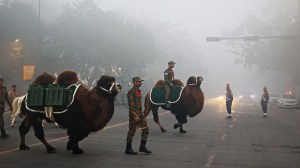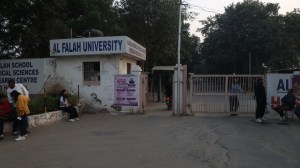Forever Yoked
This is what Santosh Mendke8217;s resume reads like. So far, Mendke has never felt the need for a resume. His work just doesn8217;t demand...

This is what Santosh Mendke8217;s resume reads like. So far, Mendke has never felt the need for a resume. His work just doesn8217;t demand it.
Today, six years after he graduated on a scholarship, Mendke has moved on from being a worker under the EGS to his current job. It isn8217;t really a promotion: He earns a thousand rupees less now, and he doesn8217;t even know if the job will last. He had to sign up because here, at ground zero of Maharashtra8217;s worst drought in 20 years, there8217;s nothing else to do.
8216;8216;Did you expect you8217;d find a graduate here,8217;8217; Mendke asks. His eyes red from the heat, as he stands on the road leading to Ahmednagar from Beed, a district with more than two million people and a literacy rate of 68 pc. Mendke supplies the answer himself. 8216;8216;Well,8217;8217; he says, 8216;8216;I didn8217;t expect to be here either. Every time I went looking for a job, I was asked to pay up. I couldn8217;t, so here I am.8217;8217;
There are many frustrated youths like Mendke in Padalshingri village 8212; around 40 km from Beed city, 400 km South-East of Mumbai in the cotton-growing belt of Marathwada.
But at least Mendke is better off than his 60-year-old father a farmer who can no longer till his barren acres who has joined scores of men building ponds, digging at tar roads and other EGS sites.
He did the rounds of government offices looking for jobs under various schemes. But his experiences indicate what the ruling Congress-NCP combine must address: Corruption. 8216;8216;The government had floated a Rs 5-lakh agro-based employment project. I went to the local administrative offices to get myself enrolled. But I was asked to shell out Rs 25,000,8217;8217; Mendke says. That, he was told, was the going rate.
8216;8216;If I had that kind of money,8217;8217; he sighs. 8216;8216;I would have started a small business instead of begging for work.8217;8217; This kind of corruption not only frustrates the educated unemployed, it also discourages others to study.
Brahmadev Chowdhary 21, who lives in Mendke8217;s village, nods like he8217;s seen it all. 8216;8216;I saw him Mendke suffer and realised I am anyway going to end up as a labourer,8217;8217; says Brahmadev. 8216;8216;I dropped out of school. Why waste time?8217;8217; He drives a roller for a living.
Listening to Mendke, the forehead of a 60-year-old woman gets even more wrinkled. She refuses to give her name but reveals she is worried about her 18-year-old son, Shivdas Shinde.
8216;8216;He is studying Arts in college,8217;8217; she says. Shinde works as a cleaner on a truck. 8216;8216;I just hope he,8217;8217; his mother says, 8216;8216;doesn8217;t end up doing this kind of work.8217;8217; Her youngest son, Devidas 15 is with her at the site. Now in Class-X, he intends to study further but doesn8217;t know what he wants to be. 8216;8216;Our children never become anything,8217;8217; his mother says. 8216;8216;We don8217;t have the money to buy them jobs.8217;8217;
- 01
- 02
- 03
- 04
- 05































